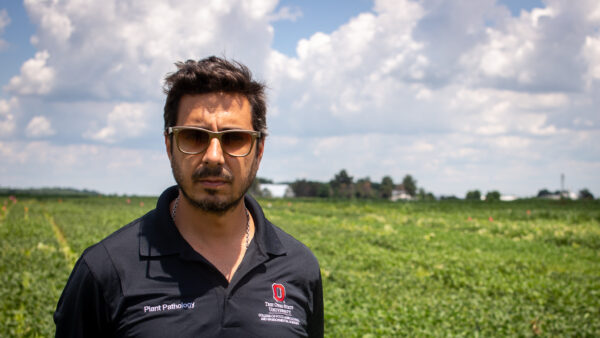How to Have the GMO Talk — the Right Way
Sometimes, talking to friends and family can be a challenge for employees in the seed industry. Here are some tips to help you talk about what you do, and why it’s important.
 Chris Davison, Head, Corporate Affairs, Syngenta Canada. |
 Janice Person, Director of Social Media, Monsanto. |
 Kenda Resler-Friend, External Communications and Media Relations Leader, Dow AgroSciences.  Fran Castle, Global Brand and Media Communications Senior Manager, BASF Plant Science. |
Consumers and the general public have many questions about the seed industry and the role of biotechnology and genetically modified organisms. Battling negative perceptions, and clearing up misconceptions, is an ongoing challenge.
“For those of us engaged in biotechnology, we see how polarized the conversation has become and it can be intimidating to enter the conversation,” says Janice Person, director of Social Media for Monsanto. “We also find ourselves heavily rooted in data and information and seeing the emotions expressed are so different than the knowledge we have; it’s hard to wade into.”
For this reason, some employees at biotechnology firms tend to be reluctant to talk about what they do. With this in mind, Seed World asked communication experts for talking points to help you discuss what you do, and why it’s important.
How can employees equip themselves with to have a successful GMO conversation?
Fran Castle (FC): For casual conversations with family and friends, we encourage employees to not only talk about the benefits of the technology, but to also understand the arguments of those who oppose GMOs. Last year, the industry launched GMOAnswers.com, an initiative committed to responding to questions people have about how their food is grown.
Kenda Resler-Friend (KRF): It’s a matter of connecting employees’ knowledge with an approach they are comfortable using in talking about GMOs. Finding the right words and tone comes with practice. Our opportunity is to effectively engage in constructive conversations with an uninformed and/or misinformed public one conversation at a time.
What tips do you have to help employees have a successful GMO conversation?
Janice Person (JP): It’s important to be conscientious, credible, courteous, compassionate, calm, cautious and creative. I usually think about engaging in a way where I am true to me and think of it as a conversation rather than a debate.
Chris Davison (CD): Become familiar with the accurate information available, ask questions if you don’t understand something and encourage others to seek out information.
KRF: We urge every employee to be open to talking about GMOs and answering questions, while being candid and transparent in those conversations. We reinforce that it is important to support the concept of choice, both for farmers and consumers.
What main messages should employees consider when talking about their work?
JP: Canned messages don’t work too well; they sound canned. But when we talk about how we personally have the confidence in the products so that we feel comfortable serving biotech products to our children or how we have personally seen the positive impact on the environment, those are experiences we can share that have real staying power for others.
FC: GMO technology has been extensively researched and studied and is safe. Plant biotechnology is a natural progression of conventional plant breeding, which has been going on for 10,000 years.
KRF: Innovation is so important to all parts of making our lives better, including our food. Through the benefits of biotechnology, the hard work of farmers and a stable food supply chain, our diet choices in the U.S. are abundant, safe, nutritious and affordable.
CD: GM food products are the most extensively tested and regulated in the entire food sector. Testing by independent public authorities and scientists throughout the world, including national and international food standards bodies, continues to demonstrate that approved GM plants are just as safe as conventional varieties.
Mark Halsall














